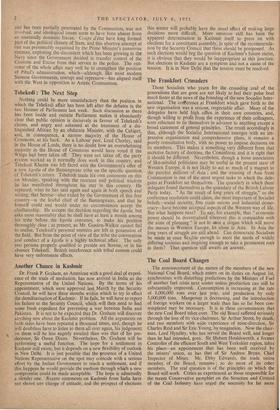Dr. Frank P. Graham, an American with a good deal
of experi- ence of the trials of mediation, has now arrived in India as the Representative of the United Nations. By the terms of his appointment, which were approved last March by the Security Council, he will have three months within which to try to effect the demilitarisation of Kashmir. If he fails, he will have to report his failure to the Security Council, which will then need to find some fresh expedient for preventing a war between India and Pakistan. It is not to be expected that Dr. Graham will discover anything new about the Kashmir problem. All the arguments on both sides have been repeated a thousand times, and, though he will doubtless have to listen to them all over again, his judgement on them will be less eagerly awaited than was that of his pre- decessor, Sir Owen Dixon. Nevertheless, Dr. Graham will be performing a useful function. The hope for a settlement in Kashmir still exists, but it depends on a new flexibility of outlook in New Delhi. It is just possible that the presence of a United Nations Representative on the spot may coincide with a serious effort by the Indian Government to reach a settlement, and if this happens he would provide the medium through which a new compromise could be made acceptable. The hope is admittedly a slender one. • Recent statements on Kashmir from India have not shown any change of attitude, and the prospect of elections this winter will probably have the usual effect of making large decisions more difficult. More ominous still has been the apparent determination in Kashmir itself to press on with elections for a constituent assembly, in spite of the recommenda- tion by the Security Council that these should be postponed. As such elections would beg the question of Kashmir 's future status, it is obvious that they would be inappropriate at this juncture. But elections in Kashmir are a symptom and not a cause of the tension. It is in New Delhi that the tension must be resolved.






















































 Previous page
Previous page